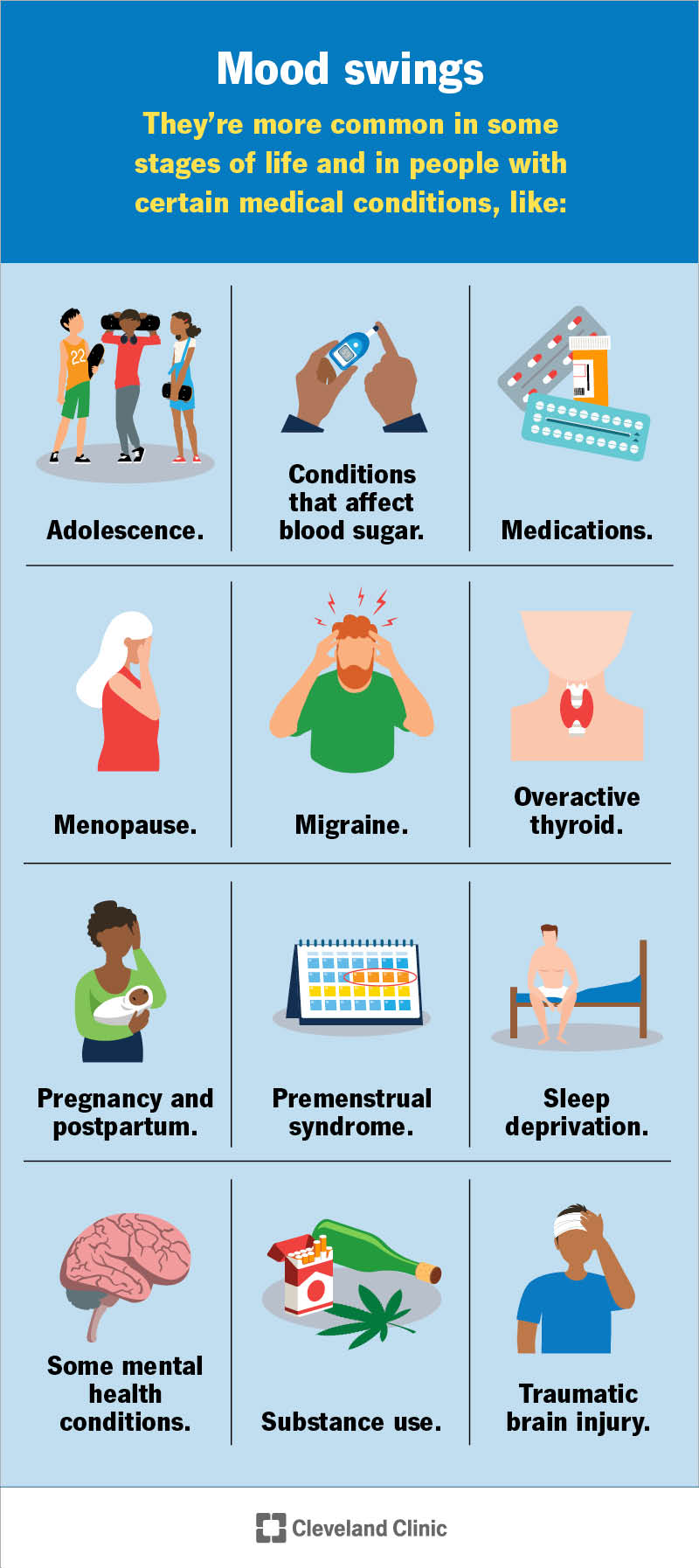Mood swings are sudden changes in how you feel. They’re caused by changing levels of brain chemicals. They can be a regular part of life, like hunger. Or they can be a sign that something else is going on, like adolescence, the transition to menopause or a mood disorder.

Mood swings are sudden changes (swings) in how you feel at a particular time (mood). Sometimes, you know what causes a good or bad mood. Other times, you can’t really pinpoint exactly why you feel like you do.
Research suggests that chemicals in your brain (neurotransmitters) determine how you feel. Many things can make the levels of these chemicals rise or fall, including missing a meal, taking a walk, playing with a puppy, getting your period and more.
Ups and downs are a regular part of life. You can be feeling fine for a while and then, like a playground swing, change direction. But when you’re swinging on a playground swing, you can anticipate when the swing will go up and down and back and forth. Mood swings usually aren’t that predictable.
Although sudden changes in your mood can be unsettling, it’s important to remember that everyone has mood swings. But if they happen frequently or have a negative impact on your life, you should talk with a healthcare provider.
Advertisement
Cleveland Clinic is a non-profit academic medical center. Advertising on our site helps support our mission. We do not endorse non-Cleveland Clinic products or services. Policy
Changes in levels of neurotransmitters cause mood swings. Just about everything in life has some impact on those chemicals. But mood swings are more common in some stages of life and in people with certain medical conditions. Substances like alcohol and medications can also play a role. Learning more about the possible causes of mood swings may help you anticipate when you might feel a shift — or at least understand why it’s happening.
Life is full of changes. And some stages of life are marked by more physical (and hormonal) changes than others. You’re more likely to have mood swings during the following life stages:
Conditions affecting various parts of your body — from your brain to your thyroid — can impact your mood. Examples include:
Mental health conditions
Sometimes, mood swings are symptoms of mood disorders like depression or bipolar disorder. Or they may relate to other mental health conditions, like:
Many different substances, including ingredients in medications, can lead to mood swings. Examples include:
Mood swings usually don’t need treatment. But if they start to impact your relationships, work or education, help is available. Your healthcare provider will focus treatment on the condition causing your mood swings. Treatment may include:
To a certain extent, ups and downs are part of life. There’s not much you can do to stop mood swings completely. But there are things you can do to reduce how often you experience them or how severe they are when you do, including:
Advertisement
Everyone has mood swings from time to time. But you might want to talk to a healthcare provider if mood swings start to:
With so many factors that can contribute to mood swings, they can start to feel like a part of everyday life. And there's some truth to that. But that doesn’t mean they have to disrupt your life or make you feel like you’re no longer in the driver’s seat. There’s a lot you can do to manage mood swings — from changes to your daily routine to medical treatment. And you don’t have to do it alone. If you’re having more — or more intense — mood swings or they become a source of tension in your relationships, a healthcare provider can help.
Last reviewed on 02/06/2024.
Learn more about the Health Library and our editorial process.
Advertisement
Cleveland Clinic is a non-profit academic medical center. Advertising on our site helps support our mission. We do not endorse non-Cleveland Clinic products or services. Policy